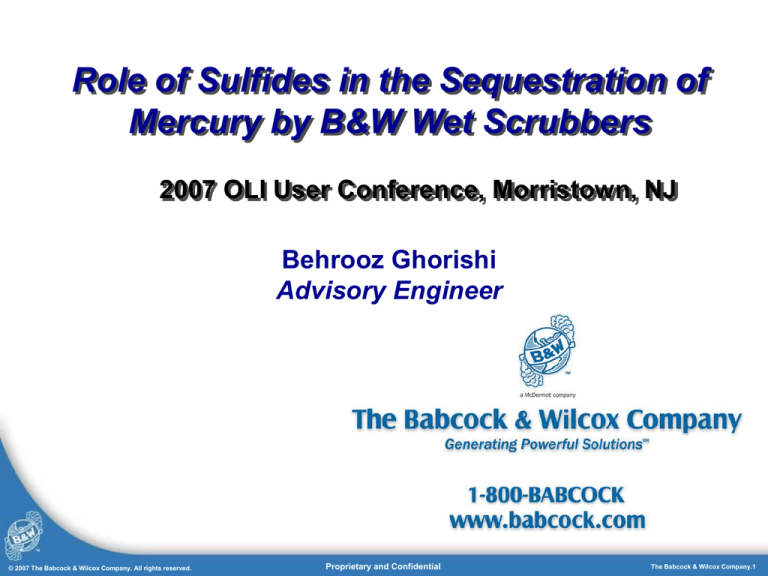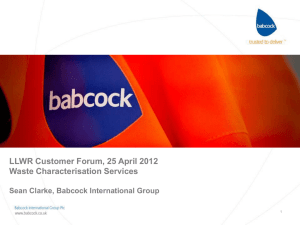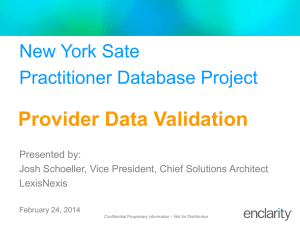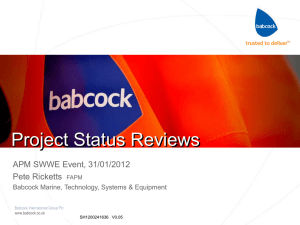
Role of Sulfides in the Sequestration of
Mercury by B&W Wet Scrubbers
2007 OLI User Conference, Morristown, NJ
Behrooz Ghorishi
Advisory Engineer
© 2007 The Babcock & Wilcox Company. All rights reserved.
Proprietary and Confidential
The Babcock & Wilcox Company.1
McDermott International, Inc.
The Babcock & Wilcox Company
Power-generating systems and equipment
For utilities and industry
J. Ray McDermott — Design /
construction for deepwater and
subsea production of oil / gas
BWX Technologies — Supplier of
nuclear products; management
and operation of government
facilities
© 2007 The Babcock & Wilcox Company. All rights reserved.
Proprietary and Confidential
The Babcock & Wilcox Company.2
Over 135 Years of Excellence
Research Center located
in Alliance, OH, since 1947
© 2007 The Babcock & Wilcox Company. All rights reserved.
Proprietary and Confidential
The Babcock & Wilcox Company.3
Typical Supercritical Boiler and Environmental Equipment
for Pulverized Coal with >2% Sulfur
Complete system provided by B&W
Hg0
Hg0 Hg2+ + HgP
Hg2+
HgP
© 2007 The Babcock & Wilcox Company. All rights reserved.
Proprietary and Confidential
The Babcock & Wilcox Company.4
B&W Wet Scrubber
© 2007 The Babcock & Wilcox Company. All rights reserved.
Proprietary and Confidential
The Babcock & Wilcox Company.5
Motivation for This Study
• Regulations for Hg control on existing and new
coal fired power plants
• Potentially high cost of control
• Implementation of Hg control using wet
scrubbers
© 2007 The Babcock & Wilcox Company. All rights reserved.
Proprietary and Confidential
The Babcock & Wilcox Company.6
B&W Strategy
• Develop low cost solutions using existing emission
control equipment
• Wet scrubber showed greatest promise.
○ Oxidized Hg easily captured
○ Issue: Some captured, oxidized Hg converts to elemental
Hg in the wet scrubber and is “re-emitted”
• B&W focused much of its research on mitigating reemission from wet scrubbers (discovery of the role of
sulfides)
• Filed tests: importance of understanding complex
electrolytic and Redox reactions in the slurry, modeling
needed
© 2007 The Babcock & Wilcox Company. All rights reserved.
Proprietary and Confidential
The Babcock & Wilcox Company.7
The B&W Road to Sulfide
No Re-emission
from boiler
Baghouse
Wet Scrubber
Re-emission
Electro static
from boiler
Precipitator (ESP)
Wet Scrubber
Why?
© 2007 The Babcock & Wilcox Company. All rights reserved.
Proprietary and Confidential
The Babcock & Wilcox Company.8
The B&W Postulate
No Re-emission
from boiler
Trace
conc. H2S
Baghouse
Trace
conc. H2S
Wet Scrubber
Re-emission
Trace
conc. H2S
from boiler
ESP
No H2S
Wet Scrubber
H2Sg → H2Saq
H2Saq → H+ + HSHS- + Hg2+ ⇌ HgS + H+
© 2007 The Babcock & Wilcox Company. All rights reserved.
Proprietary and Confidential
The Babcock & Wilcox Company.9
Discovery of the role of H2S in B&W’s pilot-scale facility
ESP power must have destroyed H2S in the flue gas
3O3 +H2S →SO2 + H2O + 3O2
© 2007 The Babcock & Wilcox Company. All rights reserved.
Proprietary and Confidential
The Babcock & Wilcox Company.10
B&W Postulate (continued)
• Precipitation of Hg2+ as HgS retards reactions
between Hg2+ and any reductant.
○ Potential reductants proposed by B&W
Sulfites
Transition metals and Sn, …
○ Very low H2S sufficient to influence re-emission.
H2S @ 1 ppm is 1000x larger than the Hg
• B&W Pilot scale tests supported basic postulate
○ Control method by H2S captured in US Patent 6,284,199
○ Method requires a gas injection grid
© 2007 The Babcock & Wilcox Company. All rights reserved.
Proprietary and Confidential
The Babcock & Wilcox Company.11
First Process improvement
• Add aqueous sulfide donor (NaHS) to suction of
recirculation pumps
○ Avoids need for gas injection grid
○ Spray header acts as distributor of H2S
○ Sulfide readily available for reaction at gas-liquid
interface
○ Very little residual soluble sulfide remains in scrubber
• This concept is captured in US Patents 6,503,470 and
7,037,474; Marketed as AbsorptionPlus(Hg)TM
• The “NaHS solution” method was field-tested
○ Success stories
○ Lessons learned
© 2007 The Babcock & Wilcox Company. All rights reserved.
Proprietary and Confidential
The Babcock & Wilcox Company.12
Successful Field-scale testing of NaHS; Endicott Station
55 MW (Ohio Bit.), limestone, in-situ forced oxidation wet FGD system
0.07-2.9 gph corresponds to 0.06-2 ppm H2S on flue gas
© 2007 The Babcock & Wilcox Company. All rights reserved.
Proprietary and Confidential
The Babcock & Wilcox Company.13
Successful Field-scale testing of NaHS; Mt. Storm Station
30
oxidized Hg
elemental Hg
OHM data with SCR in by-pass
Concentration in μg/dscm
25
In the absence of the additive:
Hg0 control of -15% (re-emission of 15%)
Total Hg control across FGD =71%
20
In the Presence of the additive:
Hg0 control of 30% (re-emission was suppressed)
Total Hg control across FGD =78%
15
10
5
0
test w/o
additive
test w/o
additive
test with
additive
FGD inlet
test with
additive
FGD outlet
563 MW (Med S East. Bit.), limestone, in-situ forced oxidation wet FGD system
15 gph of reagent corresponding to 1 ppm H2S in the flue gas
© 2007 The Babcock & Wilcox Company. All rights reserved.
Proprietary and Confidential
The Babcock & Wilcox Company.14
Other Field tests Raise New Questions
• Cinergy’s 1300 MW Zimmer Station
○ Thiosorbic® Lime (mag-enhanced) ex-situ oxidation
○ Hg removal of only 51%,
• Re-emission was not prevented
• Higher soluble sulfites?
• Higher metallic ions?
• Power Plant A, 500 MW
○ Significant fly ash penetration from ESP
○ Precipitation of NaHS by metallic ions was observed
○ Re-emission was prevented, However, higher reagent
injection rates were needed
© 2007 The Babcock & Wilcox Company. All rights reserved.
Proprietary and Confidential
The Babcock & Wilcox Company.15
Our Mission: To improve our understanding of the
fundamentals involved in preventing Re-emission
• Bench-scale laboratory studies
• Basic Chemical Equilibrium Modeling
○ OLI – A fully functional commercial aqueous
electrolytic equilibrium model
• Field experience + Equilibrium electrolytic
modeling led to some interesting findings
© 2007 The Babcock & Wilcox Company. All rights reserved.
Proprietary and Confidential
The Babcock & Wilcox Company.16
Simulation of a wet scrubber using the OLI Model
• A typical bituminous or subbituminous flue gas
spiked with 2 ppb HgCl2
• Inlet gas temperature of 300 ºF
• L/G of 70 gal/1000 acf
• Slurry of 17% gypsum
• Limestone added to adjust desired pH
• Soluble S(IV) by NaHSO3; soluble chloride by CaCl2
• Fe2+, Fe3+, Cu+, Cu2+ and other metals by their
respective chlorides
© 2007 The Babcock & Wilcox Company. All rights reserved.
Proprietary and Confidential
The Babcock & Wilcox Company.17
In the absence of sulfides, how does re-emission occur?
Two influential parameters: O2 and S(IV)
100
90
80
none
1
70
5
60
10
50
100
300
500
50
% inlet Hg
2+
emitted as Hg
0
added S(IV) in mM
as NaHSO3
40
30
20
10
0
0.1
0.2
0.3
0.4
0.5
0.6
0.7 0.8 0.9 1
2
3
4
5
6
7
8
9 10
O2 concentration in the flue gas, %
© 2007 The Babcock & Wilcox Company. All rights reserved.
Proprietary and Confidential
The Babcock & Wilcox Company.18
Hg0 re-emission mechanism in the absence of sulfide; role of O2 and S(IV)
O2vap ⇌O2aq
O2aq + 2SO32- ⇌ 2SO42Consumption of O2 by S(IV)
HSO3- ⇌ SO32- + H+
Suppression of Redox formation of H2 by O2
2H2O ⇌ O2aq + 2H2aq
Re-emission of Hg0 (Redox reaction)
H2aq + Hg2+ ⇌ 2H+ + Hg0aq
Hg0aq ⇌ Hg0vap
-----------------------------------------HSO3- + H2O + Hg2+ → SO42- + 3H+ + Hg0vap
Note: The global re-emission reaction does not reveal the role of O2 and S(IV)
Note: Hg in slurry is in ppb/ppt range, miniscule formation of H2 is required to trigger re-emission
© 2007 The Babcock & Wilcox Company. All rights reserved.
Proprietary and Confidential
The Babcock & Wilcox Company.19
Minor effect of metallic ions on Hg0 re-emission, shown for Fe
(same behavior for Cu)
2Fe2+ + 2H+ ⇌ 2Fe3+ + H2aq
Promotion of Hg Redox reactions
Hg2+ + H2aq ⇌ Hg0aq + 2H+
Hg0aq ⇌ Hg0vap
-------------------------------------2Fe2+ + Hg2+ → 2Fe3+ + Hg0vap
Only those transition metal ions capable of being oxidized to a higher state
are active in promoting Hg re-emission
© 2007 The Babcock & Wilcox Company. All rights reserved.
Proprietary and Confidential
The Babcock & Wilcox Company.20
Effect of 0.01-100 ppm H2S or NaHS
Formation of HgS prevents re-emission of Hg0 (not shown on the graph)
100
90
pH=6
80
pH=4
% precipated as HgS
pH=2
70
60
50
No re-emission
regardless of pH
40
30
20
10
0
0
500
1000
1500
2000
2500
3000
3500
4000
Fe2+ added, ppm
© 2007 The Babcock & Wilcox Company. All rights reserved.
Proprietary and Confidential
The Babcock & Wilcox Company.21
Interesting and complex interaction of metal ions, sulfides and pH
Scavenging of sulfides by metal ions
Fe2+ (and not Fe3+) + S22- (and not S2-) ⇌ FeS2
However at low pH, Fe2+ is converted to inactive Fe3+
2Fe2+ + 2H+ ⇌ 2Fe3+ + H2aq
S22- is produced from S2- via a number of Redox reaction
© 2007 The Babcock & Wilcox Company. All rights reserved.
Proprietary and Confidential
The Babcock & Wilcox Company.22
Conclusions
Importance of sulfide chemistry in determining Hg
control by wet scrubber
Importance of flue gas O2 and soluble sulfite, S(IV) on Hg
re-emission
Complex interactions of oxidizable metallic ions, pH, and
sulfides on prevention of Hg0 re-emission
Information on the level of these parameters in wet FGDs
+ detailed wet scrubber chemistry knowledge is
necessary to implement Hg control in wet scrubbers
© 2007 The Babcock & Wilcox Company. All rights reserved.
Proprietary and Confidential
The Babcock & Wilcox Company.23









